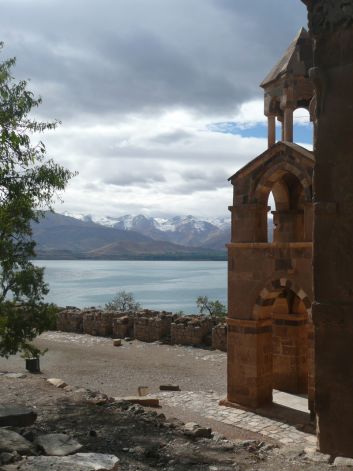A professional meeting in Antalya made Turkey an obvious vacation choice, even if I wasn’t considering returning to a country I had already visited.
This time, I asked Cemil Konuralp, the guide on my previous trip, to take me off the beaten path. His proposed itinerary was compelling: a road trip along the border of Eastern Turkey to the Black Sea.
 Day 1
Day 1
Our flight from Istanbul to Van arrived in time for us to indulge in the breakfast buffet at Merit Sahmaran Hotel. We claimed a table on the terrace overlooking Lake Van to dine on cheeses, yogurt, fruit, nuts, honey and fresh breads.
Fortified, we drove along the southern shore of Lake Van, Turkey’s largest lake, past apple stands, herds of sheep and a road sign pointing toward Iran 43 kilometers away. We sipped tea until the ferry to Akdamar Island appeared.
Lake Van glowed turquoise against the snow-capped mountains to the northwest. The 10th-century Akdamar Kilisesi (Church of the Holy Cross) came into view. This Armenian Orthodox cathedral was part of a royal complex that included a palace, monastery and terraced gardens. The recently restored church, with its exterior relief carvings of Old Testament scenes, is stunning.
Van, the market center for Kurdish tribes, was capital of the Urartian Kingdom in the ninth century B.C. Human settlement in the area, however, dates to 5000 B.C. Today, Van’s main street teems with traffic.
After lunch, Cemil guided me to Atasoy Art, specializing in Urartian jewelry and fine reproductions. We saw necklaces of ancient glass and gold-embedded beads thousands of years old.
Day 2
We set out early for Hosap Kalesi, high above the village of Hosap. Original structures on the site date from medieval times. A Kurdish lord rebuilt the castle in 1643, an extraordinary domain with hundreds of rooms, including a dungeon, harem, selamilik (men’s quarters) and a sunken theater where fights were held for entertainment. Enough remains to fuel imagination.
Next stop: Cavustepe, the mountain-top ruins of an Urartian fortress built in the mid-700s B.C. The guard, 72-year-old Mehmet Kusman, pointed out the kitchen, bath, water cisterns and huge buried pots still containing grain. One of few to know the Urartian language, he read the palace dedication, moving his fingers over cuneiform symbols chiseled into basalt blocks nearly 3,000 years old.
After lunch in Van, we stopped at the well-known Urartu Carpets, and with Cemil’s bargaining, I bought a fine kilim.
Day 3
Dogubeyazit was our next destination. The road hugged the Iranian border, military watchtowers dotting the hills. A stop at Muradiye provided views of the lush waterfall from a suspension bridge. We passed through a field of black volcanic rock, a moonscape extending for miles
Dogubeyazit’s claim to fame is proximity to Mount Ararat, Turkey’s tallest mountain at nearly 17,000 feet. According to the Bible, Noah’s ark came to rest on its peak.
We visited the meticulously restored 18th-century Ishak Pasha Palace. Afterward, we drove right to the Iranian border, where lines of waiting cargo trucks stretched out of sight, and we marveled at a huge meteor crater dating to 1938.
Back in Dogubeyazit, we were two of four guests at the Sim-Er Hotel, where the staff was preparing to close for the season. For our extremely private dinner, the chef catered to my semi-vegetarian diet with a beautiful stuffed eggplant.
Day 4
We began the long drive to Kars early. Cemil suggested a detour to the village of Tuzluca, noted for its salt mine. He maneuvered our car deep into the mine, then suggested tea. Of many such stops, this was the strangest: tea in porcelain cups in a cavern draped in tiny lights, furnished with ornate love seats and wingback chairs, served by the 20-something owner, his gel-spiked hair pointing every which way.
via A journey off the beaten path in Turkey – San Antonio Express-News.